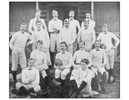
The Evolution of Rugby Clothing
, by Matthew Buckland , 5 min reading time

, by Matthew Buckland , 5 min reading time
The humble beginnings of rugby can be traced back to 1823 when a young William Webb Ellis ran with a ball for the first time at Rugby School. This moment is recognised as the game’s invention, and since then, we’ve seen it grow exponentially.
Rugby has seen a lot of change over the last two centuries, from a change in the game's format to different governing bodies. Most visibly, though, is the change in clothing. Modern rugby kits have come a long way since the 1800s, with plenty of changes between then and now. Let's take a look at the evolution of rugby clothing!
After the initial invention of the game, we saw the first rugby “kits”. The clothing of choice was a white buttoned shirt, white trousers, walking boots, and the icing on the cake, a bow tie.

Soon enough came the need to differentiate between rugby teams, and players swapped sophistication for practicality, opting for woollen jumpers. An improvement, but hardly ideal for such a physically demanding sport. Heavy cotton shirts replaced the knitted option, but this traditional rugby top style still had drawbacks.
The material was still far too heavy, too hot in summer and even worse in wet weather, which could see the tops get up to 3 kilograms heavier as they absorbed the moisture rather than wicking it away.
The jerseys were also too baggy, making it far easier for defending players to grab the attackers, giving them an unfair advantage. These baggy jerseys were commonplace for years until synthetic materials were developed and became more accessible.
Similarly, footwear has been through a significant evolution. The earliest rugby players wore shoes that are a far cry from the classic rugby boots we see today, with many resorting to strapping metal studs to the bottom of their shoes to play. Much like rugby clothing, rugby boots underwent only minor changes until the 1960s and the development of synthetic materials. Only then did we begin seeing significant updates to rugby boots that led us to the high-tech, professional standard boots we see today.

For many years, we’ve seen the traditional rugby top silhouette worn as a fashion statement, although it wasn't until the 1950s that people started donning the jerseys away from the pitch. For fans, it was a way to feel connected to the sport without having to play.
Since then, traditional rugby tops have been in and out of style, with big fashion names such as Ralph Lauren and Gucci trying to perfect the design. Not to mention the celebrities who have sported them throughout the years; Mick Jagger, David Beckham, and even Princess Diana have all contributed to the iconic status of the traditional rugby top.
This classic style is still very prominent today, with brands like Ellis Rugby producing shirts to celebrate team styles from the past century and retro-style jerseys specially made for the Rugby World Cup 2023.

France Rugby World Cup 2023 Championship Jersey
The horizontal stripes we often see on fashion tops were originally used to show team colours. In fact, a deal was made between rugby and football teams, agreeing that rugby shirts would use horizontal stripes while football shirts would use vertical.
A major evolution in rugby clothing came with the 2003 Rugby World Cup. The new, tight-fitting tops made it much harder for opponents to grasp. Rubber gripper prints on the shoulder and sides of the shirt made gripping teammates in the scrum far easier, as well as carrying the ball.
Most vitally, the cotton and polyester blend meant that sweat and moisture were wicked away and made the shirts far more comfortable.
The evolution of rugby clothing has only continued since then. Year after year, we see new technology and developments in kits that seek to help players perform at their best.
Fast forward to today, and rugby kits are worlds away from the white trousers and bow ties of the past. Typically, the tops worn by professional players in matches are made from pure polyester and have a tight-fitting cut. Some tops are a cotton-polyester mix, though these tend to be used in club and international replica shirts for fans more often than they’re worn in matches.

New Zealand Maori Replica Jersey
Today, kits don’t only focus on technical features; we have seen some pretty iconic designs in recent years, and kits are commonly used to celebrate teams' culture and history.
Visit our website to browse our full collection of kits, jerseys and boots.. For more news, updates and rugby information, take a look at our blog.


